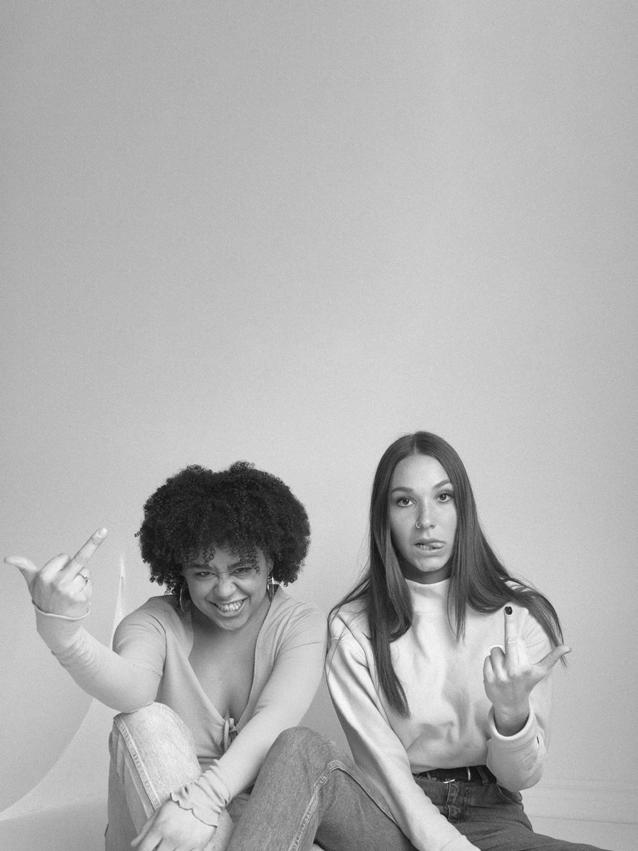swine
social



Editor’s Letter • Jessica Murdoch
President’s Address • James Atkins
Nuance and Social Media: Is It Even Possible? • Jessica Murdoch
Is Romantic Love the Be-All and End-all of Connection? • Tayla Botelho

Flesh-and-Blood Friends • Tina Tsironis
How to Talk to Strangers at Parties • Imogen Lenore Williams
Volunteering at Swinburne • Blaine Harris
Clubs at Swinburne • Various
An Interview with a First Nations Representative • Jessica Murdoch
Jim • Chamath Withanapathirana
Lady from Iran • Syed Saif Uddin
Let It Go • Girish Gupta
Join
with thanks to our sub-editors:
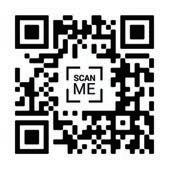
Hi! I’m Jessica and I was working full time as a primary school teacher, before I decided to come back to uni to do a Media & Comms degree. After graduating last year, I am now writing a YA novel (so there’ll be a lot of letting out a breath I didn’t know I was holding) as part of a Master of Arts (Research). Procrastination queen, I definitely spend too much time on the internet (I was busy being social online before COVID made it necessary) or with my nose in a book. At least now I can claim that it’s for research.

Hi everyone! Welcome to another issue of SWINE Magazine, our first for 2021.
My name is Jessica, and I’ve been a regular contributor to SWINE magazine over my time at Swinburne. I feel so lucky to have the opportunity to take on the role of Editor in 2021.

I’m excited to have the opportunity to work with emerging writers and artists (including those who may never have had a chance to share their work before). There’s nothing quite like seeing your name in print for the first time and I genuinely love the thrill of working with people to get their work out to an audience.
we interact with others, how we value those different types of connections, or about the responsibility we have to each other. Recent experiences have certainly given ample opportunity to think about what ‘social’ really means to us – on a personal, community, and even global level.
Hello again! Zoe here, I’m a Product Design Engineering student and live for design. I’m in my final year, a.k.a that sweet spot where uni and life are about to hit real hard but here I am distracting myself by pouring my heart into the magazine! If you want to talk plants, female and WOC representation, animals, or just good design in general… you know where to find me. Also a huge shout out to my wonderful friend Adele for helping me with this issue, I wouldn’t have made it without her. You can find her on instagram @adele.designed.
Writing about issues that matter to me is really important, and I want to provide opportunities for students to find and develop their own voice, and gain confidence to do the same. Because ultimately, SWINE is all about you, the students. It’s about providing you with a platform to share your thoughts, questions, creativity and connections.
For that reason, Social felt like a meaningful theme to kick off 2021. After a strange 2020 (and let’s be honest, a little uncertainty still about what 2021 may bring) it feels worthwhile to reflect on what ‘social’ signifies to you. Whether we’re thinking about the ways
I’m so excited that we have been able to bring you such an eclectic taste of what our Swinburne community has to offer – poetry, how-tos, experimental fiction, personal editorials and information about some of the opportunities and experiences you can have here. I hope many of you reading this feel inspired to contribute in the future (including all you visual and digital artists – we love photography and visual art as well! Plus, we have a website where we would love to host your creations). Follow our socials to keep in the loop about future themes, prompts and deadlines.
I feel so grateful to be part of such an awesome team. Extra special thanks to our current Communications Officer and SWINE’s 2020 Editor Tina, but also to the whole crew that made this issue come together so smoothly. I’ll keep my fingers-crossed that we all get the chance for some in person social interaction soon!
Jessica xxSwinburne students, and welcome to Semester One! My name is James, and I am thrilled to be your Swinburne Student Union (SSU) President for 2021.
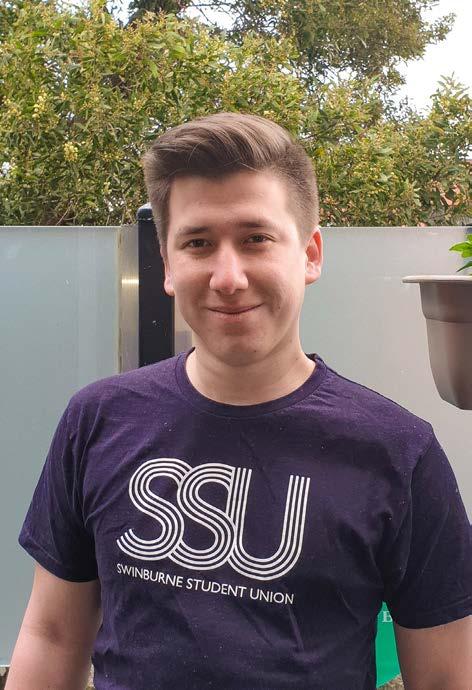
The SSU is the only independent, student-run representation, welfare and events service here at Swinburne. Our services are available to all Swinburne students, and we are run by a diverse and progressive group, who are here to support you across every aspect of your student experience. 2020 was a challenge for the entire student community, and as we move into this new year it is clear that we are still facing some uncertainty. But as always, the SSU is here to provide you with the representation and services that will help you succeed throughout your time at university. Circumstances may change the services we provide, but we will always be here to help you during your studies – on-campus and online.
During 2020 the SSU won many hardfought campaigns to protect GPAs, extend Swinburne’s Census Date across all courses, and provide fee relief for
international students during a onein-a-lifetime crisis. This year, we will continue to advocate for your needs, to ensure that you receive the quality education and university experience that we all deserve. Make sure you sign up for a 2021 SSU Membership so we can continue representing you, and so you can access all the services and discounts available this year – including free lunches and cheap drinks at the Hammer & Swine Bar (within COVID guidelines, of course).
Follow our Facebook page to stay up to date on the various campaigns and services that the SSU and our Collectives and Education Board are providing this year, and don’t hesitate to get in touch with us if you’re keen on getting involved. If you have any thoughts about how we can help to improve student life at Swinburne, chuck us a message too! Whatever aspect of university life you wish to pursue, there is a place for you to engage with the SSU.
James Atkins President Swinburne Student Unionpresident’s address
The global pandemic hasn’t completely changed the way I spend time online, but it has certainly increased it. Perhaps it has just amplified patterns. The feeling of never-ending, ongoing crises have fed my consumption, or is it that I’ve spent more time consuming because I have fewer other things to do...? This feels like a chicken/egg situation. One thing I have noticed, is that I’m trying to think more consciously about the way I engage with social media. Not in an overly judgmental way. Sometimes it’s literally just realizing what I’m doing and naming it, ‘yep. You're stressed about what’s happening. You’re doom scrolling.’ Even if I can’t stop in the moment, acknowledging my behaviours decreases the length of time I engage in them, and thus makes it easier to disengage, or make a different choice next time. Behaviour patterns are like muscles it seems; it can take a while to strengthen them.
But when social interaction was reduced (at least for a while there) entirely to online interaction, reflecting on my own behaviour also made me consider the way broader online connections and communities are shaping us as human beings, in good and bad ways.

And I say ‘more’ because as a nerdy millennial, this is not the first time I’ve wondered about this stuff. I’ve been interested in the role social media plays in molding our behaviours, interactions, and even our psyches, at least tangentially, for a while.
While I consider these questions with you, I do want to ensure that we’re approaching these concepts in a useful way. Not with the extreme doom of ‘social media is ruining our lives’, or the mindless marching forward with ‘technology as progress’ that some of us celebrate without considering the cost – but with genuine reflection and gentle curiosity. What impact does online social interaction have on us?
It’s fascinating to me, how social media and online platforms have changed the way we interact. Can you imagine how different the past year would have been if lockdown had happened in another time? For some of us, connecting online was the only way we could continue our lives – work, study, social. It hasn’t been without its problems, and I
worry sometimes about how it may be used in the future to justify cost-cutting choices, or by expecting workers to be available around the clock. Making classes and workplaces more accessible is great (it perhaps should have happened earlier and is particularly important for many people, such as members of the Disability community who have long been seeking out these types of accommodations), but in making the divide between home and work even harder to discern, I worry how it will affect us.
I spend a lot of time online. Do I need to work on the balance? Probably. But as many of us are already aware, and others may slowly be discovering, online life is real life. And it’s becoming increasingly integrated and mainstream, with a spillover effect to even those who don’t consider themselves very ‘online’ people.
The way that we interact online – including the spaces we use, the media we consume and the people we engage with, all have an impact on the way we think, what we believe and how we view the world.
In turn, this has ongoing impacts, on both an individual and societal level.
As someone who sees a lot of positives about online spaces, I do wish there was more room to discuss potential issues or phenomena in less judgmental ways. Is it possible to have all the benefits of
connection and convenience, without any of the downfalls? I’d like to think that it is, at least without the worst of the worst…ie the extremist hate and scary proliferation of countless conspiracy theories and harmful misinformation.
One thing I really wish we could do more of, though, is discuss the potential pitfalls of the medium, without devaluing it entirely and looking to throw the whole thing away. It is evident that as soon as you raise any kind of question or critique, someone will immediately react defensively. Is it the medium itself that contributes to this, or is it something else?
This pattern of behaviour, where we attach ourselves to people or ‘sides’ until it becomes a part of our identity, also contributes to the unwillingness many of us demonstrate, when it comes to having productive discussions. Rather than being able to hear claims on an argument’s merit, we focus on talking points from our ‘side’. Yes, I’m thinking particularly about politics with this point! (And call me biased, but one side seems to do it more than the other). It’s interesting, because this also absolves us from having to reflect on whether our behaviours line up with our claims.
From all sides, we hear a lot of statements like:
‘I’m an ally, so you can’t call me racist.’
‘I’m a feminist, so you can’t question the choice I’m making.’
…rather than thinking about ourselves as complicated human beings who, yes, may aim to live up to these ideals but shouldn’t feel as though we have failed or that our whole identity is called into question if we don’t, when we are asked (in good faith) to reflect on whether our claims match up with our behaviour. For example, I can’t call myself an ally and say that Black Lives Matter, but then never reflect on the ways that my white privilege effects my existence, and the lives of other people.
This defensiveness is often more broadly applied, too. When people make mistakes (of any kind), it seems you can’t criticise anyone (particularly a public figure), without the risk of their stans and supporters piling on in their defence. Why is that? What would make a person who has no actual connection to someone, feel the need to come flying in to their rescue? And it can go the other way too. If a public figure doesn’t make a statement or make their views explicitly clear about an issue, people will often flock to their accounts to demand an explanation. Why do people land in someone’s DMs, or post comments insisting that the account holder respond to some particular incident, or state their opinion about an issue or person?
Why do we feel so personally aggrieved when our fave doesn't respond in the way we think they should?
(Remind me to talk more about this
concept of parasocial relationships another time).
As I’ve stated all along, there must be room for nuance and balance here. When someone, especially someone with social power messes up (or worse), there is nothing wrong with expecting accountability. In fact, I can’t leave this conversation without noting the importance of power dynamics more explicitly. There is definitely a pattern to who is more likely to be ‘cancelled’ and who is more likely to be the poster child for how ‘cancel culture is ruining lives’. You’ll be shocked to hear that it tends to reflect the same oppressive patterns of the rest of society.
I feel like we may be dealing with two issues here. One is this struggle we have, where we see the world in extreme binaries and soundbites (which must at least be exacerbated by the nature of online platforms and the ridiculous speed of current day news cycles), rather than as complex and nuanced elements that make up the world. The other issue is the way we interact with other people online – not with strangers necessarily, but with people that we don’t actually know in any kind of equal way.
I really enjoy discussing these issues with nuance. Maybe doing so is futile, but I still think it’s worth trying. Ultimately, I guess I’m concerned because it feels like nuanced, balanced conversations about, well anything, these days seem so difficult. What are the solutions? I’m not sure. What do you think?
 Tayla Botelho
Tayla Botelho
In the span of 365 days, two state lockdowns, one heartbreak and redefining my sense of home thrice, I have experienced the whiplash of a complete 180 on the value of romantic connection and how it shapes our sense of self.
You may have heard some say that the five people you spend the most time with are the sum of your parts. This concept may compel introspective review and typically provokes an audit of our platonic social networks, but in so many other ways, we are taught that a romantic partner should be our primary, if not sole, companion through whatever life may throw at us.
We learn a mindset that highlights how the loss of ‘our person’ is the epitome of heartache and provides the most fruitful lessons, but in the elevation of this type of attachment, our other sources of fulfilment are buffered out and considered of less value than their romantic counterparts.
From an alarmingly young age, we are conditioned to believe that this is the beall and end-all of connection, whether this is filtered via Disney depictions or more widely in other media. We are exposed to myths of dating and fairy tales of ‘true love’ before we can fully grasp their implications, or understand how to build a sustainable connection rather than aiming for something so idealised. For many young women, we were reared to radiate desirability and taught to tolerate the male gaze in the spirit of romantic notions.

There are many unspoken standards about how we, as young adults, are expected to love one another and what this can signify to the world around us. I know so many people who face
the feeling of failure if they haven't obtained validation from their foreverperson, expecting their relationship to rise above any tribulations and trauma accompanied in the mess of life during their 20s. But how can you blame them? We are set up to fall as we place our relationships on a pedestal; a smoke signal to all of our nearest and dearest that we have aced the holy trinity of stability, success and satisfaction. It’s like there’s an invisible romantic timeline measuring the golden standard of milestones and miscellaneous happenings, like a calendar of fantastical love.
Who drafted the script on how we form romantic love, and why is it such a prominent building block in the understanding of our worth? Why do we rely on constructed narratives in films, on social media, in the opinions of others, to normalise, define and measure what is sacred? This fails to consider other pathways. What about polyamory? More casual attachments? Or any other way our connections may not live up to heteronormativity?

What happens to the children who never see themselves represented in fairy tales? And what more can be expected of us when our reality is completely shattered and all that we’re left with are sharp, shiny puzzle pieces that split our perception and no longer reflect what we thought to be true about the caricature of love? (Answers welcome, please send to taylabotelho@gmail. com)
By the grace of consistent therapy, friendships fortified by heartbreak while the world burned, and approximately 186 hours of a tasty folklore and evermore combo (kudos to the 2020 charity work courtesy of T-Swift), I have found myself in a new stage of life, a chasm where my freefall isn’t quite as frightening, because I understand now that I don’t need to connect myself to one other person. At the end of the day, the only the-one person I will ever need is myself.
So dear future me: here’s to the longgone friends and lovers that you might still think about for years to come, not because you reserve a placeholder for a reunion, but because they taught you how great of a gift it is to give your love to someone. Without that experience, maybe you never would have realised what you need now and what you don’t.
Here is to those past loves; the ones who weren’t quite sure of what they wanted, who now stand as bright beacons reminding you what it means to love someone who will treasure you, and offer you their heart in return.
Here’s to realising this is only a taste of what’s out there, because the world is brimming with wider realms and wilder possibilities than you can even imagine. You are deserving of all of the love that people sing slow, happy songs about. Don’t let that impermanent, yet valuable loss, crack your lens on the love that’s still ahead for you just yet.
stuck at home and I miss my friends.
itself into my hippocampus with Kiera’s latest what-about-me-ism.
I miss Kiera with her subtle putdowns and Jay with the floppy fringe tickling their left eye and Tony with the propensity to bow his head and pop his collar when a pretty person talks to us and Violet with her impeccable blending skills, save the tiny fleck of skin that always appears on the same spot right at the tip of her nose. They’re still flesh-and-blood but are they really, when they’re trapped behind a fortified glass screen?
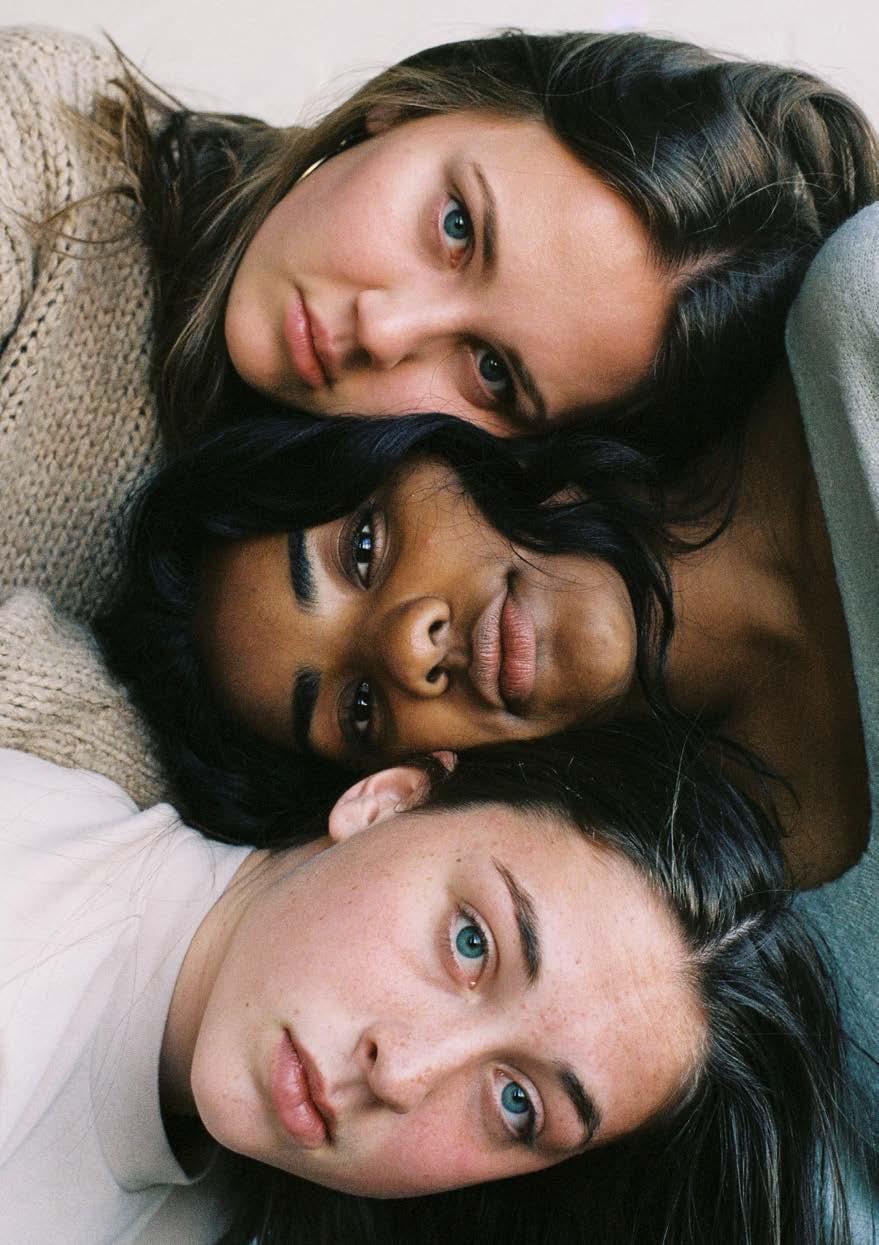
I’m always at home but now something’s different: I have new friends.
Meet Freddy with the shiny knife-fingers and Grogu with the bulging eyes so wide and curious and Beth the awkward chess genius with an eye circumference greater than Grogu’s and Dani with the smooth golden hair, not a strand out of place, at least not by design. Like most close friends they distract me from class and cleaning and putting on pants, while quietly compelling me to pull out my sketchpad.
But right now, my sketchpad stays closed because DING trills my phone, slicing through my ears and launching
Her words settle in my gut nice and tight and don’t hesitate, even for a second, to bring our other friends with it. Jay’s stubborn fringe and Tony’s all-consuming shyness and Violet’s perfectly imperfect makeup beg for equal space in my stomach but there’s not enough room so they have to make do with my sternum, and FOOOP goes my sketchpad because it’s slipping out my hands and down towards the crack separating my bed from my bedside table, and I don’t bother retrieving it because I’m sat stock-still on my bed asking myself this: shouldn’t absence make the heart grow fonder?
I should really retrieve my sketchpad, but Beth is about to verse the US chess champion who’s one tobacco chew away from drawling YEEHAW and screw it, my bedcovers are far too warm and cosy and I’m not ready to come out, much less open my sketchpad and struggle through my own fictional creations. Maybe tomorrow.
Tomorrow seemed doable but a few tomorrows later my hands stay locked on each side of my phone screen, playing hype girl to Freddy as his knifefingers come to life and slice through his
thousandth batch of victims. My fingers ache dull and I know the cure lies in stretching them out and marking my sketchpad, but there’s no use pretending I’m anything but lazy right now.
At the very least I’m keeping Freddy company while he follows his dreams, even if those dreams somewhat selfishly consist of murdering people in theirs. I should really retrieve my sleep pattern.
But I have no time because only a few tomorrows later I’m dragged from my bedcovers and planted CLACK on the cool marble floor of a café so full of natural light that it causes me to involuntarily clamp my eyes shut. Home is no longer requisite. I’m baby yanked out the womb prematurely and it takes all the godforsaken strength I can muster not to wail PUT ME BACK IN but I’m not actually baby, I’m twenty goddamn three years of age and I’m facing my flesh-and-blood friends for the first time in four months, so there’s no backing out now.
We reach in for hugs and retreat a little too fast, as awkward and asynchronous as all our communication has been of late. Everyone’s different, but regular person different, not serial killer different or alien baby different or chess champion different or haunted pretty
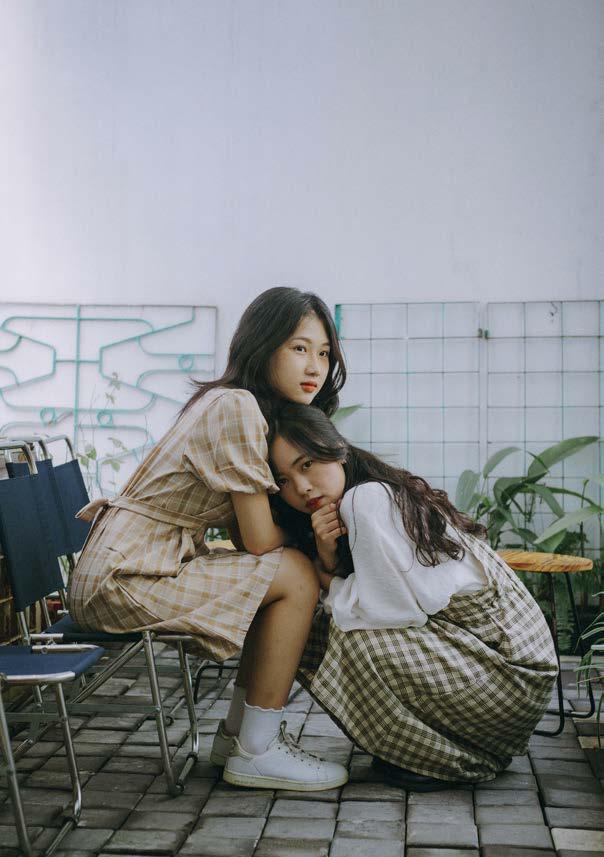
girl different. Kiera’s a no-show and Jay’s chopped their fringe but it’s still floppy and cute and Tony has yet to break eye contact or pop his collar and Violet has added some metallic purple eyeshadow to her makeup repertoire but if I squint hard, I can make out that dry piece of skin on the tip of her nose, sitting there like it never left, not through the entirety of lockdown. And then there’s me, with prominent undereye circles and my insatiable need to escape into the world of fiction.
Before I can apologise for my slobby bad looks, I’m overpowered by Violet’s orange-coconut scent and soft cool hands. She squeezes my face and pulls me into a hug and Jay’s fringe wobbles as they kiss the top of Violet’s head and Tony lets out a husky belly-laugh and pops his collar, not once breaking eye-contact and it’s then that I realise, eyebags or no eyebags, maybe I’m not ready to retreat. Not quite yet anyway.
It is more tomorrows later that I reach down into that lonely dark crevice and yank out my sketchpad.
I pull open its cover and stretch out my fingers, marking the first blank page I can see with the beginnings of a shy, floppy-fringed, glittery human – one that is destined to become a fictional friend to many.
Witha vaccine on our doorsteps, or at the very least just around the corner, the frequency and size of social events is set to increase. You know what that means – no longer will you be able to justify your hermit habits with the line, ‘I can’t come, I’m worried about corona’. Sure, this past year you were worried about corona, but you were also worried about ending up standing alone all night or trapped in awkward chats with creeps and quacks – two situations you certainly didn’t miss when COVID kept us confined to our homes. If you have struggled socialising with strangers since you started school, the 2020 social chasm will have only worsened your fears. Even the most experienced extrovert may be feeling a little rusty. So, to stop the 2021 social calendar from appearing nightmarish, here is a five-step guide on how to talk to strangers at parties.
 Imogen Lenore Williams
Imogen Lenore Williams
A vital step before any conversation can commence, is deciding who to talk to. But as most of us know, facing a group of people you don’t know is pretty intimidating. Also, there is the issue of timing. If the group is conversing, butting in can be rude, but standing by eavesdropping while waiting for an opening can look creepy. It is often best, then, to pick somebody who is standing alone.
If you are nervous, pick someone you will find easier to talk to. For example, if you’re a man who feels most comfortable talking to other men, approach one. However, if you have some confidence and you are single, pick the most attractive person you can see. You may as well go for gold. Why waste those conversational skills on somebody you have zero interest in?


Once you’ve selected your subject, you must approach them. Walk over to them with purpose. Get their attention with a simple greeting. ‘Hello’, ‘Hi!’ or ‘Hey there’ are all excellent choices. Say it loudly, clearly and confidently. Make eye contact and smile, as this will make you seem open and likeable. Now, it’s time for the name exchange: ‘I’m [INSERT NAME]’, and then they should reply with theirs. Pro tip – repeat their name back to show that you’ve understood them, and to help you remember it!

To finish Step 2, provide a reason as to why you approached them. Be honest: ‘I don’t know anyone here, I’m trying to find someone to talk to’, or if you’re feeling outgoing: ‘I saw you and thought you looked like a good conversationalist.’
Engage in relevant small talk, perhaps about the event or each other. Starting with a question is a great trick, since it forces the other person to respond. Examples are: ‘How do you know
[INSERT PARTY HOLDER’S NAME?]’, ‘How are you enjoying the party?’, ‘Have you had anything to drink?’, ‘What are you studying?’, ‘Where do you work?’. Don’t shoot these all out at once, ask one at a time. Utilise their responses to these questions, as they will act as springboards to further discussion!
For the first example, if they say, ‘I know Alex from Primary School,’ you can respond with, ‘Oh really? What Primary School did you go to?’. If you play this right, you can pursue a whole discussion around school, something almost everyone has experienced and thus a pretty easy discussion topic.

In summary, constantly ask questions of the other person, continue the conversation by building on whatever information they provide, and disclose relevant information about yourself at appropriate intervals.
When the well of small talk is dry, you’ll need to find a way to further the discussion. If you’re lacking inspiration, use the things you see around you as prompts. Mention their clothes (‘I love your outfit!’), other people (‘Kat over there is such a lightweight’), the décor (‘This room works so well for a party’), objects in the house (‘My Mum has plates just like this’), or even trees in the yard (‘I wish I had room to grow trees in my garden’). Anything can be a conversation starter if you try hard enough. However, use this trick with restraint. If you’ve had to rely on it several times in the one exchange, and you’ve resorted to talking about the curtains, the conversation is dead. In which case, Step 5 is for you.
Remember, these five steps are only a guide. Feel free to bring your own personality to the table. If you want, go wild: bark like a dog, sing a song in Italian, regale strangers with a story of the time you walked into a mirror because you didn’t see yourself coming. You never know, this might make you some fantastic friends (yes, these examples are far too specific to be made up…). If you’re still scared about talking to people you don’t know, remember the phrase ‘fake it till you make it’. By pretending you are confident, you will appear confident, and others will believe it. Eventually, maybe you will too.
Perhaps you’re enjoying talking to your new friend. The conversation is easy, and that five-step plan you walked in with? Forgotten. If this is the case, continue chatting and enjoy your night. But if you haven’t been so lucky, it’s time to abandon the sinking ship. Don’t just walk off, though, be polite. Close the conversation with a line like, ‘It was nice to meet you’ or ‘It’s been great chatting with you’ (even if this is a lie). If it doesn’t work and the chat hasn’t died, because the mind-numbingly boring person on the other end of the conversation hasn’t picked up on your exit cue, you will need an excuse to leave. ‘I’m going to get a drink’ can work, but there’s always the risk they

will want one too and come with you. Another option is, ‘Oh sorry, I’ve just seen my friend and I promised to go talk to them,’ but for this you need to have somebody in your line of sight that you can approach and start speaking to. The best excuse is always, ‘Sorry, I need to go to the toilet’, because it is unlikely the boring/strange person will want to come with you (especially if you are not of the same gender).
I have to add, if you’re talking to somebody who you think is a bit off, and you feel uncomfortable, be wary when using the ‘need to pee’ excuse. If they say they’ll come to the bathroom with you and your alarm bell rings, get away from them by latching onto somebody you trust.

University can often feel lonely and isolating, but the communal nature of the volunteer program (and the Swinburne Student Union more broadly) enables students to meet likeminded peers and build new, tight-knit, eventually longlasting friendships.
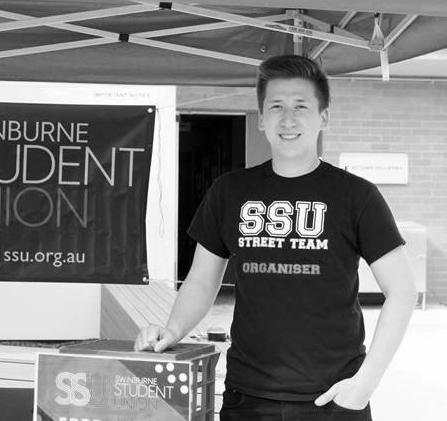
Recently, I asked some new and experienced volunteers from a variety of backgrounds about their experience with the program – why they joined, what they’ve gotten out of it, and how their student life has improved since joining the SSU family. Keep reading to find out more.
James Atkins (SSU volunteer)President/formerStarting at university, there are units to study, clubs to join, parties to attend and more cafes and restaurants than you can poke a testamur at.Volunteering with the SSU Street Team helped me find my centre, get involved with campus life and make a positive change at Swinburne. As a regional kid, finding new friends at university was always a worry, but the Street Team is now a supportive family for me. My involvement with so many young and passionate people continually inspire me to go further in my studies and my work within the Union. For anyone who wants to make friends, support the Swinburne community and even fight for their rights as a student, the SSU Street Team is a great place to start.
Nguyet Minh(International student)I think a great gain from volunteering is building soft skills like communication, teamwork, and even leadership. As an international student, volunteering with other students and meeting many new people was a great chance for me to improve my English, and learn about Australian working culture while studying at uni. I think improving English is a great benefit of volunteering for international students. Besides, it's always fun making sausage sizzles with the volunteer team - It never feels like work, not when I’m hanging out with my friends and laughing non-stop.

I went into my first year at Swinburne not knowing anyone. I had no one from my high school going to Swinburne, and I found myself sitting alone at lunch during my first few weeks at uni. Then I joined the volunteer program, and made so many good friends while serving sausages and breakfast to students. If I hadn’t joined this program back in my first year, I wouldn’t have the friends I have today, and wouldn’t feel as strong of a connection to the Swinburne community as I do now.
As a local student, it is easy to fall into your comfort zone by going to uni to study and then leavin In my first year, this lifestyle made me feel a bit isolated and lonely during my breaks between classes. While I did form some friendships, I found myself longing for a solid group of friends at Swinburne. This is why I began volunteering with the SSU in my second year, at the weekly BBQ and daily breakfasts. The program has brought me some of the most exciting times of my uni experience, as I have met many new and interesting people. With these new friendships formed I also began attending the weekly Thursday night events run by the SSU (pre-COVID), which are always a lot of fun. Without the SSU, I would have never made all these new friendships, nor would I have formed such great memories that will last a lifetime.
Being a regional student, moving to Melbourne and making new friends was overwhelming When I first started at Swinburne, I decided to sign up for various volunteering opportunities, including volunteering for the SSU. Although I was nervous to meet new people, I found that I easily fit in with the group and began finding my place at the university. Joining the program has since benefited me in many ways, from finding new friendships, helping me settle into university life, and feel less isolated beginning life in Melbourne. I would definitely recommend this program to any student who wants to make a lifelong impact on their own life, and that of others.
Being an international student, it's easy to feel isolated (COVID & 2020 aside) when you arrive in a new country. Joining the SSU volunteer program was my way to find a sense of community, meet new people and make new friends and connections as I navigated my way around a completely new environment. After 1.5 years, I can proudly say that I made the right choice joining the program. Not only did I find people who I identify with and can easily be myself around, but I have also found a way to contribute my time to the Swinny community. I have gotten to know so many fascinating personalities and make such authentic relationships, all because I simply said yes to volunteering for the SSU. It takes 5 minutes to fill out the form and change your life for the better. What are you waiting for?
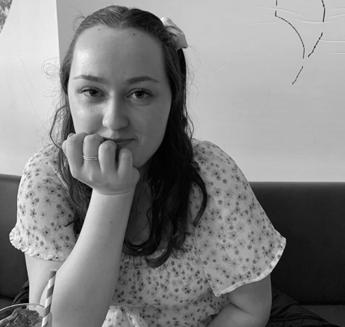

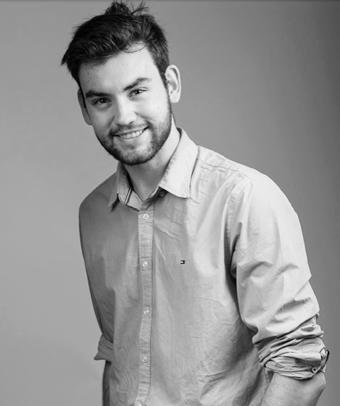
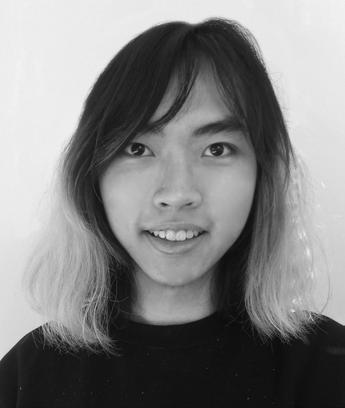 Blaine Harris (Local student)
Danny Phan (International student)
Alecia Frizziero (Local student)
Emily Duffus (Regional student)
Blaine Harris (Local student)
Danny Phan (International student)
Alecia Frizziero (Local student)
Emily Duffus (Regional student)
Swinburne is home to a beautifully diverse range of clubs, from the cheese-related and cultural, to the sporty and industry-based.
We spoke to club committee members from some of Swinburne’s best and brightest clubs, to help you determine the right club – and community – for you. (Pro-tip: all of them!)

Who are you, and what is your role? Asher Marks – Club President.
Who do you think your club would most appeal to?
This club is for anyone – its main focus is to have Jewish representation on campus. If you are looking to meet other Jewish people or learn about the culture, AUJS would be well suited.
Tell us about a recent club highlight, event or success story.
Being a smaller university, the Jewish community at Swinburne is quite small. Three years ago, there wasn’t an AUJS here at all. Since then, we have increased our numbers and are looking to grow even more, and create a larger space for Jews to meet, learn and share our culture.
As simple as signing up via UniOne. Our Exec board is very open and happy to help with any questions, or if you want to meet more people. We have a lot of different programs available, some Swinburne based and others incorporating other unis.
Who are you, and what is your role?
Jarryd Worland – Vice President.Who do you think your club would most appeal to?
Behind the Game aims to provide a safe and inclusive space for all creative people. Although we’re a Game Development club, there’s plenty of development opportunities for programmers, artists, designers, writers, audio composers and more. Even if you’re not studying Game Development, there’s a place for you.

Tell us about a recent club highlight, event or success story.
2020 has been our most unpredictable year so far. Our Discord server has helped members connect with each other outside of events, and has helped us promote events and industry news. Throughout the past year, we’ve held tutorial sessions, working spaces, game
streams, interviews with industry veterans, and we recently completed a Game Jam.
The flexibility of Discord, and our members, has been a welcome comfort for all of us as we continued to study, support one another, and rely on each other to keep our spirits up during last year’s trying times.
How can students get involved?
Be sure to sign up to the club through UniOne – our club memberships are always free. Despite COVID restrictions, we will still be able to hold weekly online events throughout semester. We also have channels on Facebook (Behind the Game Swinburne) and Twitter (@BTGswin), where you can stay up to date with news and upcoming events.
Who are you, and what is your role?
Stephanie Popovski, President.
Who do you think your club would most appeal to?
Anyone who loves cheese, or just wants to make some friends. As much as we try to stay on topic, we are definitely as much of a social club as we are a food one. We even have some lactose intolerant members!
Tell us about a recent club highlight, event or success story. The fact that the Cheese Club has existed entirely during lockdown has restricted what we can do, but it hasn’t stopped us. We ran some very successful events in our first semester, including a Q&A session with a retired cheesemaker over Zoom, which was a fun and insightful experience, as well as a cheese themed Kahoot night.
How can students get involved?
Sign up via UniOne, join the Swinburne Cheese Club Facebook group and Discord server, and hopefully soon you’ll be able to come to some in-person events!
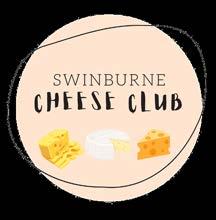
Who are you, and what is your role?
Daniel Grunow, Club President.
Who do you think your club would most appeal to?
The Chess Club is geared towards both new and experienced players. If you’re interested in playing chess or learning a new skill, the chess club is for you. We hold sessions for beginners as well as time-controlled tournaments. Details of these events can be found in our Facebook group (Swinburne Chess Club).
Tell us about a recent club highlight, event or success story.
The Chess Club has continued to function throughout the year with weekly online events, and we’ve recently expanded to holding events 3 times a week. We’ve also begun to branch out, with some of our players competing in Melbourne Chess Club tournaments.
How can students get involved?
Join the club via UniOne, and join our Facebook group by searching Swinburne Chess Club.
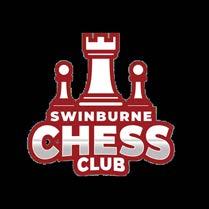
Who are you, and what is your role?
Emily Duffus, and I am the President.
Who do you think your club would most appeal to?
Criminology students, along with students who have an avid interest in true crime, horror and the law.
Tell us about a recent club highlight, event or success story. We ran many events this year. Despite low numbers we managed to get nearly 100 members, which I believe is a huge effort for a very new club. We ran a games night with Deakin Criminology Society, and it was a very popular event, with 30 students attending.
How can students get involved?
Follow our Instagram (@ swincrimforensics). We keep everyone updated via that platform! We also have a Facebook group and page (Swinburne Crime & Forensics Society), and are always looking for feedback and ideas, so feel free to message us!

Who are you, and what is your role?
My name is Emilia Cox, and I am a second-year student studying my Bachelor of Design.
Who do you think your club would most appeal to?
For students currently studying or interested in this field. We welcome everyone from all branches of design. If you want to join a community of support, work opportunities and education, then you should definitely come check us out.
Tell us about a recent club highlight, event or success story. We feel that we have been able to be very close as a committee; remaining in contact, holding regular meetings, and making plans as a club despite the roadblocks and challenges 2020 presented us with. We’re so excited to see what this new year can bring.
How can students get involved?
For updates, please follow us on any of our social media, and go through the Student Life portal (unione.swin.edu.
au) to join. We also have a hashtag on Instagram, which we use to share our members’ creative designs. So, tag your posts with #SeeMeSDC to be featured!
Instagram: @sdc_swin
Facebook: @sdc.swin


Who are you, and what is your role?
Matt Nguyen, Social Media Manager.Who do you think your club would most appeal to?
Students who have played, or are interested in playing soccer, whether it be indoor or outdoor. The club mainly focuses on maintaining a friendly competitive atmosphere, so students of any skill level are welcome.
Tell us about a recent club highlight, event or success story. Prior to the events of 2020, which kept us from holding any events, the Swinburne Futsal Club organised its first of many female-only nights. The event enabled female students to come and play each other with some friendly competition, in a safe environment.
How can students get involved?
Please like our Facebook page (Swinburne Futsal Club) and follow for updates on when our next social nights will be taking place
Who are you, and what is your role?
Alecia Frizziero – President.Who do you think your club would most appeal to?
The Swinburne History Society is perfect for any student who has an interest in world history from the 20th century to the Bronze Age. We’re also perfect for students who want to learn more about history on a week-by-week basis, and meet friends with a common interest.
Tell us about a recent club highlight, event or success story.
Despite 2020 being a tough year, we managed to stay connected with our little history community via our online events, and our notorious history memes chat. Our online events connected us with future committee members who have proven themselves to be loyal and dedicated.
How can students get involved?
Join the History Society via UniOne. Also, follow us on social media to be updated on our weekly events, including our meetings and movie nights!
@swinhistory – Instagram
Swinburne History Society – Facebook
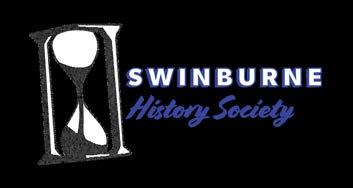 Swiburne Crime and Forensics Society
Swiburne Crime and Forensics Society
Who are you, and what is your role?
My name is Millie, and I am the secretary of the club.
Who do you think your club would most appeal to?
Anyone studying Media and Communications, or anyone interested in exploring the field. We plan to hold industry talks this year, to give students the opportunity to network and learn. We also have a Discord channel and will be running events this year, so students can meet people who also share an interest in Media and Comms.
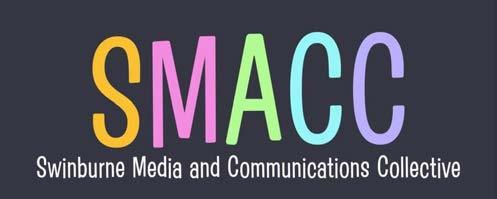
Tell us about a recent club highlight, event or success story.
For me, the re-branding and reregistration of the club in 2020. When I started at Swinburne, I was looking for a club that would connect me with like-minded students, and run events that would help with my professional
development. It was great to be a part of SMACC’s development and learn all about the registration process for clubs.
I was so inspired when our logo design came through by Renee Chung, a fellow Media and Comms student. It’s been great seeing Renee’s work front and centre.
How can students get involved?
We would love to have you involved, so please register via UniOne, and we will be in touch early in the semester. Follow our Facebook (Swinburne Media and Communications Collective), and Instagram (@sumacc_) to hear all about the latest events.
If you’re keen to join our Discord, send us a DM on our socials and we will add you in. We’re looking forward to meeting so many Media and Comms lovin’ students this year!
Who are you, and what is your role?
Amy, Poetry Club President.
Who do you think your club would most appeal to?
Either any student who enjoys writing poetry, or listening to others read theirs.
Tell us about a recent club highlight, event or success story. We have weekly themes to help spark members’ imaginations, but students are also allowed to bring poems of any style or subject. Our best events have been simple poetry readings in the park or at the bar.

How can students get involved? Jump onto UniOne and join the club through there. We also have a Facebook group and Instagram account under the same name (Swinburne Poetry Club). We send out weekly prompts via email or social media.
Who are you, and what is your role?
My name is Dani, and I am the 2021 President of SPCC.
Who do you think your club would most appeal to?
The best part about SPCC is that everyone is welcome! We appeal to anyone wanting to meet new people, make friends, or enjoy social gatherings.
Tell us about a recent club highlight, event or success story. Being a smaller university, the Jewish Late last year we hosted a 12-hour collaborative Halloween event with a handful of other clubs. It was very successful and has inspired our 2021 committee to go bigger and better (where safe) this year! Our members have also been meeting regularly on our Discord and in-person for their regular dose of socialising.
How can students get involved?
Please find us on UniOne and sign up if SPCC interests you! Or, to get a taste of what we’re all about, head to our very active Discord: https://discord. gg/3zbNYPHZUm

Who are you, and what is your role? Nam Tran – President.

Who are you, and what is your role?
Apurv Chandrawal, President.
Who do you think your club would most appeal to?
SPC is a diverse club open to any student, of any nationality. It would most appeal to students who want to take some time out of their busy schedule to socialise and learn more about Punjabi culture.
Tell us about a recent club highlight, event or success story.
Pre-COVID in 2020, we celebrated the Holi festival at Swinburne, which turned out to be a very successful event. During COVID, we teamed up with the university and the Sikh Interfaith Council of Victoria (SICV) to provide free vegetarian meals to Swinburne International students.
Our greatest highlight was the Virtual Diwali event we ran. Diwali, known as
the Festival of Lights, is normally one of the biggest festivals celebrated at Swinburne, so it was great to be able to retain this success even though we were online. We had the Vice-Chancellor and Vice President of Swinburne University attend the event, along with the Consulate General of India, and Hawthorn and Forest Hill MPs. The event included games, cultural dance and song performances, and free meals for 250 Swinburne student attendees across Melbourne. This event was a big success – even students who were offshore at the time were able to attend.
How can students get involved?
You can always reach out to us via Facebook (Swinburne Punjabi Club) or Instagram (@spcswinburne), or shoot us an email via UniOne and we’ll get back to you as soon as possible. We’re here for the students, and our ultimate goal is to bring a smile to your faces.
Who do you think your club would most appeal to?
We are open to all PhD and Higher Degree by Research students, especially those new to their research degree without a support base – whether that be not knowing anyone, or just wanting to expand your network. SPRA is also great for exploring whether the PhD is something for you – a good opportunity for Honours students to check out.

Tell us about a recent club highlight, event or success story. A recent highlight was our 2019 end-of-year BBQ. It was nice to see students from so many faculties come together over a shared lunch and friendly sports.
How can students get involved? FREE memberships are available via Swinburne UniOne! Search ‘Swinburne Postgraduate Research Association’.

We’re very excited to be continuing the SSU Rep Interview series we began last year, where we take some time to sit down with current office bearers so you can get to know them, and better understand the role they play in representing you.
For those who may not know, SWINE Magazine is actually a part of the Swinburne Student Union’s (SSU) Media Department. In this last year particularly, the union has played an important role providing a voice for students during a challenging and tumultuous time. Overall, the SSU advocates for students’ welfare and academic needs, provides students with important services, and manages a variety of events.
We know that ‘social’, this edition’s theme, can cover a lot of ground – it’s not just the way we socialise together, but also how we care for each other. Within the Swinburne community, the SSU’s team of Welfare Representatives have been elected to ensure that all students feel represented, connected and cared for. So, to kick off the series for 2021, our Editor Jessica Murdoch spoke to First Nations Representative Patrick Taylor about the ins and outs of his role, how important it is to platform First Nations students’ voices, and what
he’s most looking forward to when we return to campus.
J: Thank you for chatting with SWINE for our very first 2021 edition, Patrick! Tell us about your path towards First Nations Representative – how did you initially get involved with the SSU?
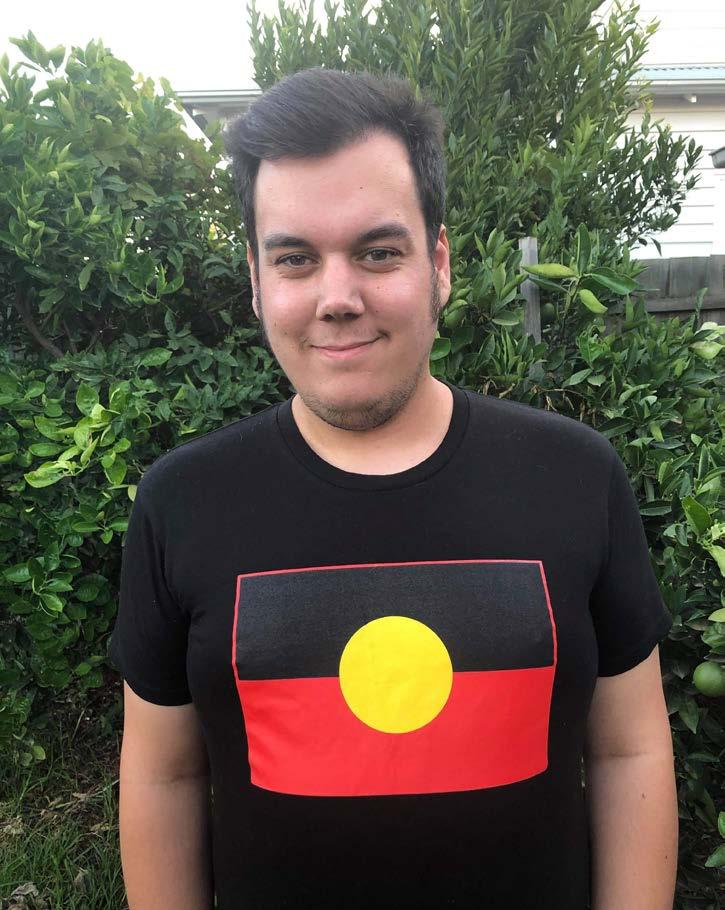
P: I have worked in Early Childhood Education for almost nine years and I was the Union Rep for the centre that I work at. When I started studying at Swinburne, I gave up that role, but I still felt like I needed to be part of a Union, so I looked up the SSU to see what they were all about. I was looking through the Representatives section and saw that there was a vacancy for the Indigenous Rep role.
Then on my first day at Swinburne, I had a First Nations student orientation with the Moondani Toombadool Centre and all the other new First Nations students starting. We spoke with people about all the services that Swinburne offer. The SSU was one of them, and I asked a few questions about how to join. Then I had a meeting with some of the members of the union and they thought I was a great fit, and a week later I was made the First Nations Rep.
J: What does your role entail, exactly?
P: My role falls under the Welfare Collective of the union. As First Nations Rep, I help with the welfare and wellbeing of any First Nations student attending Swinburne. This could be by answering any questions students have or developing connections between students and First Nations support services like the Moondani Toombadool Centre at Swinburne.
Part of my role also involves sharing the many different cultures that make up Swinburne’s First Nations student body with the broader Swinburne community.
J: What do you think the university can do to ensure a safe and culturally inclusive community for First Nations students, both on-campus and online?
P: Firstly, I think we are getting on the right path when it comes to First Nations student matters at Swinburne, with things like our Reconciliation action plan and the First Nations
support offered through the Moondani Toombadool Centre.
I would like to see more opportunities for First Nations students to voice their concerns directly with Swinburne. Because we make up a small number of the student population, I feel like our voices often get lost. This year I am going to start up a First Nations Collective which will provide First Nations students with the opportunity to share their concerns around these issues.

J: You’ve been the First Nations Rep for nearly two years now! What have you enjoyed most about undertaking this role?
P: One of the things I have enjoyed about my role has been the opportunity to share my culture through music. For Reconciliation Week I created a playlist of First Nations Artists from around the world, which was shared with Swinburne students. This fell right in the middle of the first lockdown, so I loved sharing something that students could enjoy during that time. You can
listen to the playlist here.
Meeting lots of like-minded people who are working to achieve the same goals has also been amazing.
J: What is one piece of advice you would offer to Swinburne students wanting to involve themselves in the student union movement?

P: Do not be afraid to give the Union a go, and do not be afraid to ask questions –there are never any dumb questions.
J: How do you plan to involve yourself in Swinburne’s social scene this year –whether online or off-campus?
P: I plan to join some of the clubs that Swinburne has to offer, and hopefully when we get back on campus, have a few beers at the Hammer and Swine.
To find out more about the range of services the SSU provides, check out our website.
You hear footsteps. You look up. It’s him. He’s here. He smiles at you. You smile back. His teeth are yellowed from the coffee he drinks each day: two sugars, one Mississippi of milk. You can smell his breath. That’s not possible; he’s too far away. You think you can smell his breath. It smells like smoke. His left hand smells like smoke. He uses his right hand to play on his phone while a cigarette dangles off the other. He holds them with his index and his tall man. You know if you stare at his hand while he smokes, he will tell you all about how in Europe they smoke with the cigarette held between the thumb and the index. He’s never been to Europe. He’s seen films about Europe. You want to roll your eyes, but he loves you and you love him. Your pinkie finger hurts. You got it clamped in a drawer fifteen minutes ago.
It’s funny how the pain goes away and comes back like that. You rub your finger with your other hand and then stop. You don’t want him to ask you what’s wrong. It drives you mad seeing his face scrunch up in concern. He’s sweet. Too sweet, sometimes. You get up from your office desk. Exhaustion sets in and you smile at him again. Jim. Jimmy. Jimminy Christmas. He hugs you. You hug him back. A dinner date. How exciting. You wave goodbye to your colleagues and walk out of the office together. It’s snowing outside. He changes sides so he can hold your hand with his right hand. The hand that doesn’t smell. Thoughtful.

The snow falls steadily as you walk to
his car. You swing your hand up and his flies up with it. He smiles. You smile. His expression changes. His eyes are blank. His knees buckle and give way. He falls to the ground, hitting his face in the snow. You watch him fall. You stare, and then you scream and you scream. People stop. Some walk away faster. Some get closer and form a crowd around him. Someone’s on the phone. They’re turning him over. More people keep walking. You see faces. You see eyes. Eyes prying, eyes comforting, eyes worried, and eyes that don’t want to meet yours.
Someone’s holding your arms. You look up. It’s Jan. She works with you. She’s got pretty blonde hair and tiny thin lips. She steers you towards a car and makes you lean against it. She’s speaking to you, but you don’t understand what she’s saying. Her hair bounces around in the wind. You are reminded of the weeds that used to grow around the field near your childhood home. The field caught fire one scorching summer and the weeds just died and didn’t grow back. Has Jim died? Jan’s got little snowflakes in her eyelashes. You want to brush them away. Every snowflake is unique. Jim is unique. One of a kind. Or he was unique? Is it too soon to be thinking of him in the past tense? You look towards him. He’s still on the ground, but there are more people around him now. A man in a black hat seems to be performing CPR on him. Another has a phone pinned hard against the side of his face. He looks around frantically, quite possibly scanning for any landmarks he could
Jim’s shoes point smartly upwards, their soles covered in brown snowy sludge. They are unmoving. Jan is still talking to you. You decide to see Jim for yourself. There is no point in waiting around. If he’s died, he’s died. If he hasn’t, he hasn’t. You walk closer. Jan follows you.
You notice his packet of cigarettes lying on the ground next to him, and you are overcome with a shudder that has nothing to do with the cold. You’re numb to the cold anyway. You choose to focus on the pack of cigarettes as you walk closer to the small crowd. Jan is by your side. You wonder if anyone else from the office has heard or seen what happened. Everyone loves Jim. Or loved Jim. Someone steps on the pack of cigarettes accidentally. You can tell they didn’t mean it by the way their leg jerks back up clumsily. The packet cracks open and peppers the snow with little crumbs of tobacco. None fly away in the wind. They’ve been dampened.
You are now part of the circle surrounding Jim. He’s lying on his back. His face is sprinkled with snow. His forehead is wounded, but the blood has already congealed. Probably because of how cold it is. You scan the neighbouring ground around him for patches of scarlet but find none. An image pops into your head of a single drop of blood on a white sheet. It was just a drop, you think to yourself. Just a
Chamath Withanapathirana jimdrop. Nothing more, nothing less.
The man in the hat is still giving Jim CPR. With every chest compression, Jim’s head jerks upwards sharply. Action, reaction. What you do to others, lest be done unto you or something along those lines. The man on the phone crouches down next to the man in the hat and begins describing what he sees. You hear him say ‘breathing’. The two men talk amongst themselves and to the person on the phone. Man in Hat still has his hands upon Jim’s chest. They aren’t moving. You see a ring. Jim wears a ring. It has a black stone set in it. You hate that ring.
Jan puts her hand in yours. The same hand Jim had been holding. You think about whether you caused this. Guilt sets in. There’s snow on Jim’s chest. It melts quickly. These people are concerned about Jim’s wellbeing. You believe you are as well. You wish you were as well. To set the record straight, you let out a silent prayer.
Please let Jim be alright. Please let him be alright. Please, please let him be, you think to yourself. It took you a minute to get there, didn’t it? Do you want him to be alright? Of course you do. You love him and he loves you. You love him and he loved you. You almost let out a giggle. You bend down to Man in Hat and ask him if Jim’s alright, you’re his partner; yes, he just fell over all of a sudden; no, you don’t think he tripped; you mean, the snow might be slippery, but it wasn’t that slippery; and no, you don’t know of any pre-existing medical
conditions.

‘They’re coming,’ says Man on Phone, who is no longer on the phone. By 'They' you assume he means medical help or the police or a fire truck or maybe the Angel of Death. No! You mentally reprimand yourself. You scrunch up your face to show how concerned you are. You squat down and waddle close to Jim for the first time and brush snow off his head in what you hope is a concerned and loving gesture.
You didn’t choose this role. You must play it though. You’ve got no choice. Concerned Partner.
You begin to cry. You stop crying.
You think of your mother. Your father’s death shook you to your core. Your mother cried in the living room the day he died. Her cries sounded like cries, but they also sounded like laughs or yelps. You were seven. What did you know of crying anyway? At the funeral, you wept. She wore sunglasses. The ones she wore very often during her marriage. The ones with the wide lenses that covered up a lot of her eyes. That was the last time she ever wore them. She threw them out two hours after burying your dad. You found her sitting in bed that night. She smiled warmly at you and took you into her arms. She hadn’t smiled like that in a long time. That night the two of you threw away one of your dad’s belts. The black one. The one that was just a belt to you, but a lot more to your mother. You hear a siren. It’s getting closer.
You think of passers-by that may be wondering who the ambulance is for. You, too, have done this many times in your life. This time you know who it’s for. Jim. Jimmy. Jimminy Christmas. You know. You knew. You knew when you saw that man’s unmoving hands resting on Jim’s chest. The ambulance is here. A red light spins around, bouncing off buildings. It has come to a stop, but the engine is still running. More people look over curiously. You hear words being said. A laugh cuts through. A car horn sounds in the distance.
Jim, Jim, Jim. A man and a woman get out of the ambulance. They do many things. They touch him, they feel him, they talk. Man in Hat tells them things. You wish to explain that this wasn’t your doing, but you feel like they already know. You hear the word ‘stroke’. They haul Jim up onto a gurney. His arm flops around and his watch swings like a pendulum in a grandfather clock. His ring is on his other hand. His ring was against your chest. His cigarettes still lie on the ground, broken and soaked through. They will never be lit. They will never burn a single thing. You wish to tread on them, your soles crushing them down into the snow.
They lift the gurney up and put him in the ambulance. You notice how they are not doing anything to revive him. It clears any doubts you may have had. You get into the ambulance. Jan touches the small of your back. Supportive. Reassuring. You turn around, sit down, and thank her for everything. She asks you if you want her to come with you.
You decline. She’s surprised but doesn’t challenge your answer. They close the back of the ambulance.
There is no siren anymore.
The female paramedic speaks to you. She says she’s sorry. You thank her. She wants to know what kind of man Jim was. You tell her he was a good man. Past tense now. He was a good man, a loving man. You smile. He was tender and he was gentle. Then you tell her, because you feel like you must, because you feel like you can trust her and you have to tell someone. See, sometimes when Jim got angry, Jim hit. Jim hit, and he hit, and he hit. And now Jim is gone, and he can never get angry again. She stares at you in silence. Then she holds your hand. You look at what little of the outside world you can see through the windshield. The city looks beautiful in the snow. She squeezes your hand, and you squeeze it back.
Syed Saif UddinRoam these lands free, unfurl your wings; do it and never relent while you still can So many wondrous sights to see, stars to pluck out of the sky, my lady from Iran

Do not close those eyes yet, such beauties to behold, keep them wide open Be the woman you’re meant to be, tall and proud, in this cruel bitter world of men
Dream those dreams, reach up, live large and sing that pretty little heart out Let your passion burn hotter than the solemn sun, isn’t that what this life’s about?
You embody the purity of a lotus in a swamp, forever unrelenting like a Persian Cypress Make the earth move while reaching for the sky, be as timeless as the mighty Tigris
Smile when it is the hardest to do so, laugh in the face of any pain, hurt or anguish
Believe in yourself: that smile is a weapon against any foe you’d ever like to vanquish
Be strong, but flaws are nothing to be ashamed of, never in this lifetime dim your glow
Unless we learn to overcome our weaknesses, can we ever truly bloom and grow?
We must live before we’re rendered mere memories; you must burn brighter than the sun
Patience is a virtue, my lady; let the world gaze in awe when your golden time has come
I don’t understand any of it. I never did, I only pretend. And this maze is a life, and life, a maze, A labyrinth I don’t comprehend. For the masses are a mess With just a few who are blessed; For there’s lack of light all around, And us humans are all looking to the sky While there’s a lack of humanity on ground. Humanity? Kindness? Empathy? Love?
Just words screaming at the top of their voices. As the sky turns black, and the eye turns blind, They’re nothing but godforsaken noises. Every Fuck, and Shit and Crap and Ass, These swears for reasons I don’t understand. For they say that life’s in these tiny moments; They also say that life’s a little grand.
I wish to recognise life for what it is. There are so many theories, just lying around: What does it mean to exist?
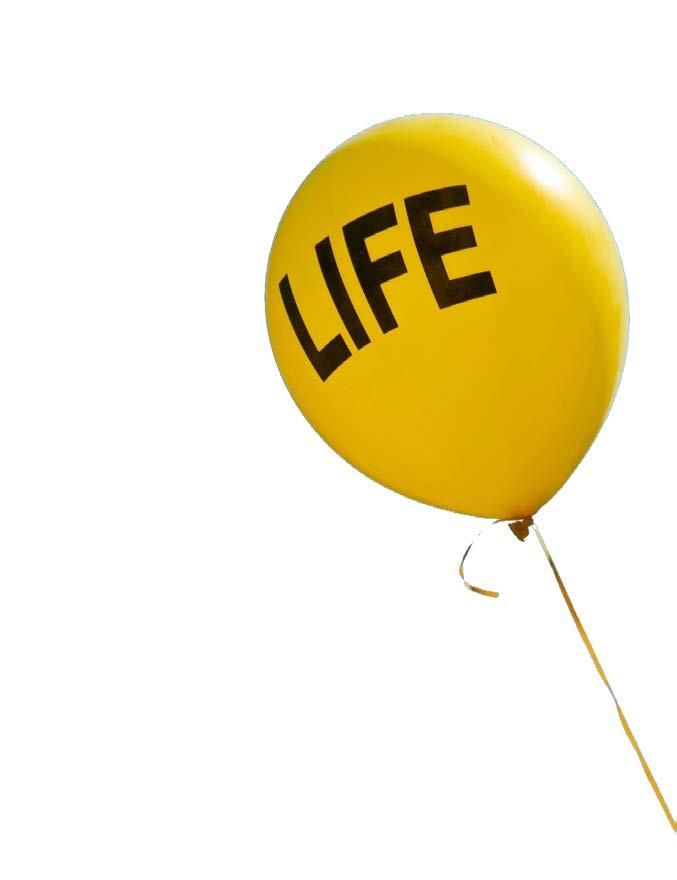
What does it mean to live?
I don’t know how to breathe sound.
We could turn away; we could walk our way.
We’re alive, We live, We breathe.
The chest is hollow, and aches a certain way.
What is it that the soul seeks?
And Life is a word, and it is so much more.
How much? Will I ever know?
I could spend it trying to answer myself, Or maybe I could just let it go.
let it go
Girish Gupta
